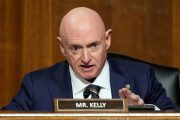
California Governor Gavin Newsom will not be listed as a Democrat on the upcoming recall ballot, a judge ruled Monday, saying the law “unambiguously” prohibits Newsom’s party affiliation from appearing on the ballot after the governor missed a deadline to file it with the secretary of state.
Newsom is facing a recall election on September 14. Secretary of State Shirley Weber, a Newsom appointee, is scheduled to finalize the roster of candidates seeking to replace Newsom this week.
While all the candidates hoping to be Newsom’s successor will have their party affiliations printed on the ballot, Newsom will not. The other candidates had to supply their party preferences along with the paperwork they filed to get on the ballot. As the officer facing recall, however, Newsom was required to submit his party preference as part of his response to the initiation of the recall petition, the deadline for which was February 28, 2020. He responded in time but did not include his party preference.
According to the Los Angeles Times, “Newsom’s attorney, Thomas Willis, took the blame for the mistake, saying that when he filed the paperwork, he was unaware that less than two months before, the law requiring officials who are subject to a recall to file their party preference had taken effect.”
Newsom, on the other hand, should not have been ignorant of the law because he had signed it in October 2019. Indeed, the law was passed specifically to permit officials facing recall to include their party preferences on the ballot, something they had heretofore been unable to do. It was so uncontroversial that Newsom probably didn’t pay much attention to its details at the time, especially since the five previous attempts at recalling him had fizzled.
After a year of lockdowns and mask mandates — not to mention a particularly egregious violation of them by the man who had imposed them — enough Californians decided Newsom needed to go that the recall election became a reality. Only then did Newsom discover his oversight and submit his party preference to Weber, who refused to accept it without a court order.
“The secretary of state agrees that it would be unfortunate if an error by the govemor’s attomey had the effect of depriving voters of accurate information on the ballot regarding Gov. Newsom’s party preference,” Weber said in court documents. “If the governor’s choice had been submitted by the statutory deadline, the secretary of state would have had a ministerial duty to accept it, and the statute would require that his party preference appear on the ballot.”
“At base this comes down to whether the governor of California has to follow the unambiguous law, and it just so happens a law he signed,” recall proponents’ attorney Eric Early told Sacramento County Superior Court Judge James Arguelles Friday. “This may be a bitter pill for the governor to swallow, but swallow it he must.”
“Willis told the judge that under the legal doctrine of ‘substantial compliance,’ Newsom should be allowed to have his party affiliation listed,” wrote the Times. “Willis referenced a California Supreme Court decision that said strict adherence to election statutes is not required in cases in which a minor mistake was made that does not affect the integrity of the election process.”
Arguelles wasn’t buying it. The law, he ruled, “unambiguously precludes party information from appearing on a recall ballot where the elected officer fails timely to make the designation.” Moreover, while “Governor Newsom argues that unique circumstances attending his untimely party designation support an order excusing the noncompliance … the court is not persuaded.” (Those “unique circumstances,” as it happens, include a four-month extension of the deadline to collect signatures on the recall petition, which was granted by none other than Arguelles.)
Early celebrated the decision, saying, “No one is above the law, and this ruling makes clear that includes Gavin Newsom.”
Newsom’s camp, naturally, was not so thrilled, though “it’s unclear if the governor will appeal the ruling,” noted the Times.
Still, whether Newsom’s party is named on the ballot or not, he may well survive the recall attempt. The Golden State is heavily Democratic, and spring polls showed only 40 percent of voters supported removing him.
Motivation and turnout, far more than a well-known-but-missing fact about Newsom, are likely to determine the outcome of the election. The fact that, according to those same polls, anti-Newsom voters are far more energized than Newsom supporters is what keeps Democrats awake at night.




